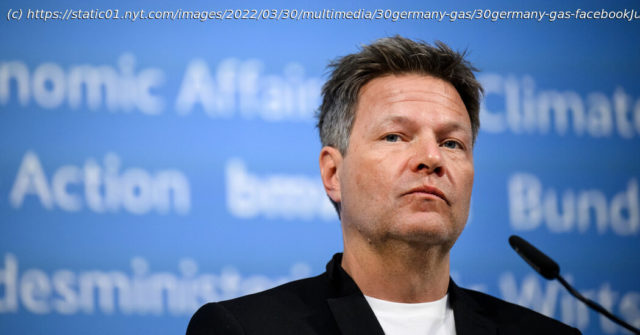The economy minister said Germany must be “prepared for an escalation on the part of Russia.”
The economy minister said Germany must be “prepared for an escalation on the part of Russia.” By Melissa Eddy Germany began preparing for eventual shortages of natural gas on Wednesday, as the country’s economy minister pointed to growing concerns that Russia could cut off deliveries unless payments on existing contracts are made in rubles. The government activated the first step of a national gas emergency plan that could, eventually, lead to rationing of natural gas. Wednesday’s action — the first step, or “early warning stage” — involves setting up a crisis team of representatives from the federal and state governments, regulators and private industry, said Robert Habeck, the economy minister and vice chancellor. The move illustrates the risk facing European countries that rely on Russian oil and gas as the war in Ukraine drags on. On Monday, energy ministers from the Group of 7 nations rejected a demand by Russia that it be paid in rubles. Several European energy companies have said payment in rubles would require a renegotiation of long-term contracts. “We will not accept any breech of the private contracts,” Mr. Habeck said. The ongoing standoff is part of attempts from President Vladimir V. Putin of Russia to push back against a wide-ranging raft of economic sanctions aimed at punishing the Kremlin for invading neighboring Ukraine. “We must increase precautionary measures to be prepared for an escalation on the part of Russia,” Mr. Habeck told reporters. “With the declaration of the early warning level, a crisis team has convened.” The team will meet daily to monitor the situation and establish measures that could be taken if supplies start running low, which Mr. Habeck stressed is not yet the case. Only if the situation were critical enough would the government intervene to begin rationing natural gas supplies. In that case, according to a planning document, households and critical public services, including hospitals and emergency services, would be prioritized over industry. Roughly half of Germany’s homes rely on natural gas for their heating, and 55 percent of the country’s gas comes from Russia. It arrives via overland pipelines through Ukraine and Poland, and through the original Nord Stream pipeline under the Baltic Sea. A sister pipeline that was awaiting German approval, Nord Stream 2, was effectively frozen by the government two days before Russian tanks rolled into Ukraine. “Security of supply continues to be guaranteed,” Mr. Habeck said. “There are currently no supply bottlenecks. Nevertheless, we must increase precautionary measures to be prepared for an escalation on the part of Russia.” Gazprom, Russia’s state-owned energy company, said on Wednesday it had continued to supply gas to Europe via Ukraine in line with requests from European consumers, and that flows remained high.
Home
United States
USA — Financial Germany moves toward gas rationing in a standoff over ruble payments.






